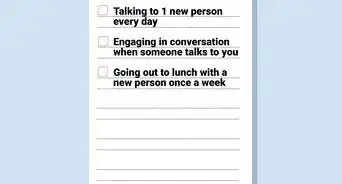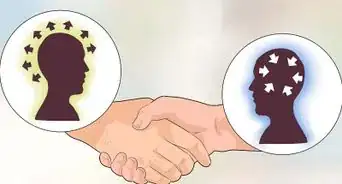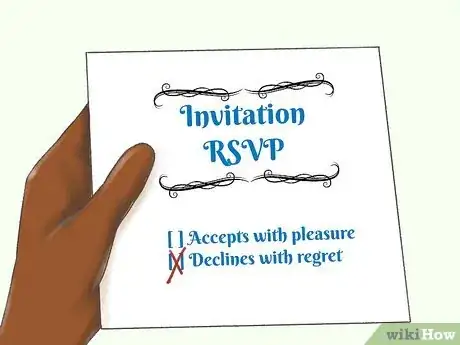This article was co-authored by Kim Chronister, PsyD and by wikiHow staff writer, Nihal Shetty. Dr. Kim Chronister is a Licensed Clinical Psychologist. She specializes in helping people struggling with substance abuse, relationship problems, eating disorders, and personality disorders. Dr. Chronister has contributed to and appeared on Access Hollywood, Investigation Discovery, and NBC News. She is the author of “Peak Mindset” and “FitMentality.” She holds an MA in Clinical Psychology and a Doctor of Psychology (PsyD) from Alliant International University.
There are 7 references cited in this article, which can be found at the bottom of the page.
This article has been viewed 14,723 times.
With their deeply caring and humanitarian outlooks, INFJs are one of the most remarkable of all the Myers-Briggs types. But how can you identify one out in the wild? Also known as “the Advocate,” “the Counselor,” or “the Insightful Visionary,” INFJ is the rarest personality type, only accounting for 2% of the general population.[1] X Research source We’ll show you all the outward signs of an INFJ and help you decide if someone you know fits the archetype with this complete guide on how to spot an INFJ.
Steps
They’re great at listening.
-
INFJs are active listeners who make other people feel heard. Their intuitive approach to the world and the importance they place on emotions means that they’re genuinely interested in other people. Although they’re introverts, they might easily be mistaken for extroverts, since they’re so engaged with other people when talking to them about their lives.[2] X Research source
- This introversion means that they’re less likely to open up to you in return. You might enjoy a wonderful conversation with an INFJ, only to later realize you hardly learned anything about them.
They’re an efficient worker (when they have a purpose).
-
INFJs want to change the world for the better and are good at it. When an INFJ is working on a project or in a role that allows them to make what they feel is a positive contribution to the lives of others, their organizational abilities kick into high gear. Although they can sometimes come off as a little spaced-out, they’ll get things done on time and produce creative and intelligent results.[3] X Research source
- You can find INFJs in a number of careers, but especially those in healthcare, teaching, or community organizing.
- Money is not as important to INFJs as it might be to other people. They tend to shy away from jobs that don’t give them a sense of humanitarian accomplishment, as working just for money burns them out.
They have a desire to make others happy.
-
INFJs can put the happiness of others over their own. If you see someone who’s always going the extra mile for other people, no matter how close they are, that person might be an INFJ. This can sometimes mean that INFJs neglect to care for themselves because they’re so focused on other people’s needs.[4] X Research source
- However, INFJs do have a breaking point. If a relationship is beginning to feel overwhelming to an INFJ, their introvert tendencies can kick in, and they might drop the relationship or even ghost.
They’re a minimalist, simple dresser.
-
INFJs can be classy, but in a very restrained way. This type isn’t likely to be up-to-date on the latest fashion trends—they’re too busy thinking about the complexity of other people and the world at large. As a result, they’re likely to dress in simple but evergreen styles that look good without standing out. They might especially be attracted to ethically-manufactured clothing items.[5] X Research source
- For example, an INFJ might wear plain turtlenecks, fitted button-down shirts, khakis, inexpensive jewelry, and other fashionable but minimalist items.
They’re moved by injustice.
-
INFJs are visionaries of positive social change. They feel deeply emotionally moved by seeing examples of global injustice, whether it’s poverty, war, racism, sexism, or any other kind of suffering. If you catch someone talking or reading about global issues and imagining creative solutions to fixing them, they could very well be an INFJ.[6] X Research source
- INFJs also have a very strict moral code. If they see someone intentionally harming another person, they’re likely to put aside their introvert tendencies to step in.
- You might catch an INFJ at a political organizing meeting or volunteering to help local communities.
They’re tough to get to know.
-
INFJs can, unfortunately, be a little flaky. While they might seem like they’re having the time of their life at a social event, you might try reaching out to them for a follow-up hang out and end up being rescheduled a few times. This type can easily feel overwhelmed after too much socializing, and they really need time by themselves to recharge their energy.[7] X Research source
- If you’re trying to get to know an INFJ, be patient. Over time, when an INFJ feels like they can let their guard down around you, they’re less likely to find socializing with you to use up their energy.
They have a close-knit circle of friends.
-
INFJs are loyal to a small group of people. Despite this type’s deep sense of compassion, they can also have a tendency to regard people they don’t know with suspicion. As a result, they’re likely to prioritize their social life around only a few friends whom they’ve decided that they can fully trust.[8] X Research source
- To create a deeper connection with an INFJ, make sure you’re always honest. If an INFJ suspects that they can’t trust you, they’re likely to withdraw for good.
They love intellectual conversations.
-
INFJs are likely to turn small talk into something much deeper. They’re fascinated by the complexity of people and society at large, and they get enthusiastic when these subjects are brought up. Spot an INFJ by seeing whose eyes light up when the conversation becomes intellectual, especially if it's about coming up with solutions to create a better world.[9] X Research source
- INFJs are readers by nature, and it’s pretty common to find them reading a book about a social cause that matters to them. Talking to them about what they’re reading is a great way to start a fascinating conversation.
They’re great writers.
-
INFJs may find expressing themselves in writing easier than in speech. Writing comes naturally to an INFJ—they relish the opportunity to express the full complexity of their ideas through writing. Although an INFJ might feel intimidated to share their ideas in conversations, they often find an outlet through the written word, and they’re quite eloquent when they do so.[10] X Research source
- Although there are other types that are eloquent writers, and INFJ is particularly passionate when talking about causes that matter to them.
- If you see a well-written op-ed or blog post advocating for some kind of positive social change, there’s a good chance it’s from an INFJ.
They’re unlike most people.
-
An INFJ might strike you as a particularly unique person. INFJs are the rarest out of all the MBTI types, and as a result, they can often feel misunderstood. A particularly self-aware INFJ might say outright that they don’t feel like other people understand where they’re coming from.[11] X Research source
- When talking to an INFJ, it’s important to offer them the same compassion they give others. Try not to let them feel like they’re “too sensitive,” since this is likely a painful subject for an INFJ.
Breaking Down the INFJ Personality Type
-
Figure out if someone is an INFJ by asking a few simple questions. It’s fairly straightforward to classify someone with the MBTI if you know what each of the components in a psychological type represents. Ask yourself or the possible INFJ directly the following questions:[12] X Trustworthy Source PubMed Central Journal archive from the U.S. National Institutes of Health Go to source
- Do you recharge with alone time (introversion) or by being with others (extraversion)? An INFJ is introverted.
- Do you spend your time thinking about abstract ideas (intuitive) or your daily reality (sensory)? An INFJ is intuitive.
- Are you more interested in logic (thinking) or in emotions (feeling)? An INFJ is feeling-oriented.
- Are you organized (judging) or do you have a more “let’s see what happens” approach (prospecting)? An INFJ is judging-oriented.
You Might Also Like



 How to Tell if an Introverted Girl Likes You
How to Tell if an Introverted Girl Likes You










References
- ↑ https://www.truity.com/personality-type/INFJ
- ↑ https://www.16personalities.com/infj-personality#
- ↑ https://eu.themyersbriggs.com/en/tools/MBTI/MBTI-personality-Types/INFJ
- ↑ https://dhrm.utah.gov/wp-content/uploads/INFJ.pdf
- ↑ https://www.truity.com/blog/how-you-dress-based-your-personality-type
- ↑ https://www.truity.com/personality-type/INFJ/relationships
- ↑ https://www.truity.com/personality-type/INFJ
- ↑ https://eu.themyersbriggs.com/en/tools/MBTI/MBTI-personality-Types/INFJ
- ↑ https://eu.themyersbriggs.com/en/tools/MBTI/MBTI-personality-Types/INFJ
About This Article

























































